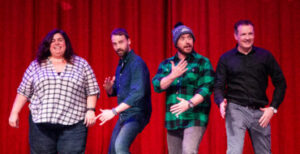Clark Rockefeller was a member of elite private clubs, the husband of a successful businesswoman, a father, an art dealer, and, it was rumoured, an heir to the Standard Oil fortune. A charmed life, with one niggling glitch—Clark Rockefeller never existed.
He was the creation of Christian Karl Gerhartsreiter, an imposter and criminal who swapped identities like an actor taking on parts. In this way, he was the consummate artist. He is also currently serving out a sentence of 27 to life at San Quentin State Prison for the murder of Jonathan Sohus.
In the one-man performance True Crime, playing at the Arts Club Theatre until Feb 24, Torquil Campbell of the indie band Stars takes on Gerhartsreiter’s strange story. Julian Brown provides a moody soundtrack to Campbell’s performance.
“I’ve always been interested in true crime,” Campbell says, explaining his obsession with Gerhartsreiter: “…we even look alike”. It’s true, they do share a certain look: an earnest face, and black-framed glasses. Both Gerhartsreiter and Campbell look trustworthy and harmless, which might explain why the former was offered jobs by various investment firms, despite knowing next to nothing about finance. This ‘look’ might also help Campbell get away with a somewhat jumbled performance.
Under moody lighting, Campbell begins the show by chatting up the crowd as Clark Rockefeller. His voice is a nasally falsetto. He repeats his name often and shakes hands vigorously. Supposedly, Clark was a charming character, capable of glad-handing his way into the most exclusive clubs. Here though, he seems slightly grating.
Campbell then returns to himself, explaining how his obsession with the man known as Clark Rockefeller developed. He describes visiting all the locations where Clark had lived in New York. Campbell sounds like a fan as much as a journalist. Coming from a family of famous thespians, including his late father Douglas Campbell and his wife Moya O’Connell, Campbell knows a talented actor when he sees one.
And Gerhartsreiter was adept at convincing the people around him that he was who he said he was: an actor, a director, a scientist, an investor, and a European aristocrat, among other things. As a teenager in Bavaria, he met a travelling American couple. He then used their names to gain entry to the States. He began an elaborate series of identity-swaps, taking on the names of Chris C Crowe, Chris Chichester, Chip Smith, and Clark Rockefeller, among others. He married twice, once in Madison, Wisconsin for a Green Card and then again in a Quaker ceremony, to a Harvard MBA graduate.
According to Campbell, Gerhartsreiter spent some time living out of a van and covered the interior with sticky notes to keep track of his multiplying lies. In 2008, Gerhartsreiter was arrested for kidnapping his own daughter. Campbell insists that this was an act of love, which is a faintly ridiculous claim. It seems obvious that Gerhartsreiter was more interested in beating his wife and in ownership than the happiness of his daughter.
Interesting people make for interesting performances. True Crime is at its best when it concerns itself with Gerhartsreiter. We also get a lot about Torquil Campbell and the making of this performance. Campbell begins by thinking about Gerhartsreiter (who he mostly refers to as Clark) and then he starts writing to him. Eventually, he goes to visit Gerhartsreiter in prison down in California. This makes his wife uneasy. “I can’t believe you got an Ontario Arts Council grant for this shit!” he recounts her saying during one of their heated exchanges.
Every performance needs friction. When you have multiple actors on stage that happens naturally enough. In one-man acts, it’s up to the lone performer to create tension out of thin air—a trick like trying to start a fire with only one stick. Playing both sides of these prison conversations, Campbell does just that. His performance here is impressive and tense.
Unfortunately, only half of True Crime is about Gerhartsreiter. The rest is a circling essay about Campbell, about being an artist, creating art, and whether art is supposed to raise us up through beauty or peel back the façade to reveal the festering nastiness below. Your appetite for this sort of thing may vary. True Crime is really a performance about the making of the performance that you are watching. This bordered on navel-gazing at times. When writers and performers go on and on about the work of writing and performing it can seem like the well has run dry.
Campbell tosses up plenty of themes—art, fear of death, crime, fatherhood, identity—but, like an overly ambitious juggler, he fails to keep them all in the air. While the scope is ambitious, an editor might have helped with focus.
Despite their similar appearances, Campbell’s connection to Clark Rockefeller feels tenuous. All the more so when he raises doubts (in the final scene no less) about whether he really went down to California to meet the convicted murderer. In trying to be clever, this ‘did-I or didn’t I…’ bit only has the effect of retroactively draining the most interesting scenes of their tension.
Campbell raises the intriguing question of our responsibility, as the audience, for the performance. If “all the world’s a stage,” then are we responsible for a man like Gerhartsreiter, who was, in so many ways, the perfect method actor. It’s not hard to see why Campbell was so fascinated with his story. Clark Rockefeller said his lines so well he played everyone for fools.









